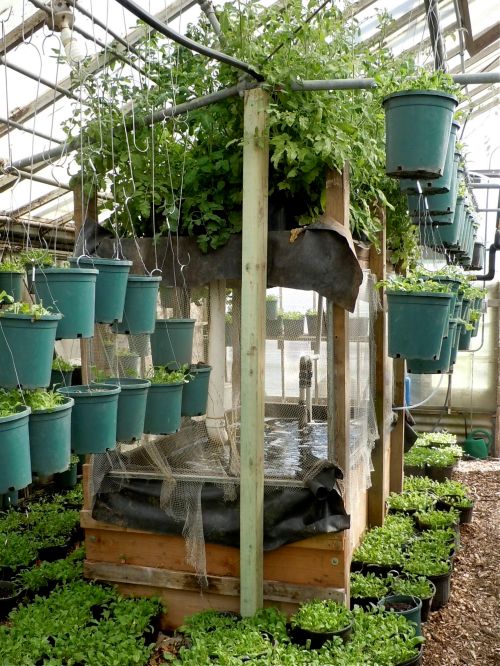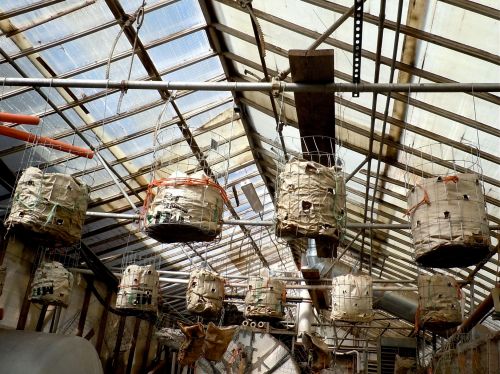[av_textblock size=“ font_color=“ color=“]
Ein sehr interessanter Beitrag der Netzfrauen (Original in Deutsch)
Genial! Gesunde, sichere, hochqualitative und finanzierbare Nahrung für alle Menschen
 „Jeder hat das Recht, gutes Essen zu bekommen“, erklärt Will Allen. Der ehemalige Profi-Basketballer, der einen Bauernhof in einem Armutsviertel von Milwaukee gründete. Mit der Farm ernährt Will Allen etwa 10 000 Menschen und hilft gleichzeitig, junge Menschen von der Straße zu holen. Mit Erfolg. Will Allen startete seine eigene Revolution.
„Jeder hat das Recht, gutes Essen zu bekommen“, erklärt Will Allen. Der ehemalige Profi-Basketballer, der einen Bauernhof in einem Armutsviertel von Milwaukee gründete. Mit der Farm ernährt Will Allen etwa 10 000 Menschen und hilft gleichzeitig, junge Menschen von der Straße zu holen. Mit Erfolg. Will Allen startete seine eigene Revolution.
Von einem erfolgreichen Basketballspieler zu einem erfolgreichen Urban Farmer.
Growing Power Projekte konzentrieren sich auf drei Bereiche: wachsen, blühen und gedeihen. Mittlerweile haben sich 300 Kleinbauern angeschlossen – und in der Tat – aus einer kleinen Idee wurde eine große Food-Revolution. Sogar das Weiße Haus lud ihn 2010 ein, um mit ihm ein Projekt zu starten – USA Gesund Ernähren, denn für gesunde Ernährung steht USA – das Land der Burger – nun gerade wirklich nicht. Mittlerweile wurde Will Allen mit vielen Preisen geehrt und ist laut Forbes einer der mächtigsten Männer im Bereich gesunde Ernährung in den USA: Growing Power verkauft die Produkte, die sie ernten, auch an Restaurants und kleine Lebensmittelgeschäfte in Chicago, Madison, Wisconsin und Milwaukee.
Seine Tochter Erika Allen leitet die Organisation in Chicago. Sie hat in Chicago acht Standorte aufgebaut. Will und Erika Allen, gemeinsam schaffen sie eine unglaubliche Nahrungsmittelrevolution. Und genau davon handelt die folgende Geschichte.
Genial! Gesunde, sichere, hochqualitative und finanzierbare Nahrung für alle Menschen
Will Allen baute in Milwaukee ein ganzes Netzwerk an städtischen Farmen und Gemeinschaftsgärten auf. Ökologisches Gemüse, Eier, Milch und Fisch werden produziert, Schulungen abgehalten, neue intensive Anbaumethoden ausprobiert und politische Perspektiven entwickelt. Die Ziele der städtischen GärtnerInnen sind, alle mit gutem, erschwinglichem Essen zu versorgen, sich von der staatlich gesteuerten, industriellen Landwirtschaft unabhängig zu machen sowie allen Zugang zur Landwirtschaft und zu einem besseres Leben zu ermöglichen.
Urbane Gärten und Gemeinschaftsgärten sind ein weltweit vorkommendes Phänomen. Immer mehr Menschen kommen zusammen, um gemeinsam ihre Umgebung zu gestalten und ökologische Nahrungsmittel anzubauen. Und genau das ist das Ziel von Will Allen.
Eine Million Pfund an Nahrungsmitteln auf nur 3 Morgen (12 000 m²) zu produzieren, klingt für manche wie ein Hirngespinst oder unseriöses Lockmittel. Aber – auch wenn es irreal erscheint – es ist definitiv Realität.
Will Allen ist ein ehemaliger Basketballspieler und steht an der Spitze der städtischen Wirtschaftsbewegung in den Vereinigten Staaten. Er ist der Gründer / CEO von Growing Power, einer nationalen Non-Profit-Organisation und Stiftung, die Menschen mit unterschiedlichem Hintergrund dabei unterstützt, für gesunde, sichere, hochqualitative und finanzierbare Nahrung für alle Menschen zu sorgen. Und genau das tun sie auch.
Nahrung ist die mächtigste Sache, es ist eine Notwendigkeit. Es ist ein Weg, um Spaß zu haben, und es hat das Potenzial, die Armut zu beenden und Arbeitsplätze zu schaffen. Wenn Menschen Arbeit und Brot haben, wird die Kriminalitätsrate wesentlich sinken, so Will Allen.
Growing Power inc. wurde 1993 als Farm gegründet, die arbeitslosen Jugendlichen eine Beschäftigung bot. Heute stehen sie für innovative Anbaustrategien, die unglaublich große Erträge an frischen, organischen Nahrungsmitteln und Fisch liefern. Wie funktioniert das?
Growing Power verwendet Aquaponics-Gewächshäuser. Dabei werden im wesentlichen Aquarien mit Hydrokultur kombiniert und die Fischausscheidungen als Dünger für die Pflanzen genutzt. Das Geniale dieses Ansatzes ist die Tatsache, dass damit quasi ein nicht endender Zyklus von Nahrungsmitteln und Dünger entsteht.
Da die Systeme innerhalb der Glashäuser zum Einsatz kommen, ist man vom Wetter unabhängig. Die Wände sind dabei natürlich ein begrenzender Faktor, aber auch hier ist man erneut innovativ vorgegangen.
Die Gärten innerhalb der Gewächshäuser werden in mehreren Stockwerken gebaut, um die Flächennutzung zu maximieren. Dieser innovative Ansatz bringt einen Ertrag von ca. 5$ pro 0,092903m2 (Square foot). Pro Morgen ergibt sich so ein Ertrag von 200 000 $ für Growing Power, inc.
Growing Power steht aber nicht nur für 100 % organische Lebensmittel. Trainings, Programme für Einsteiger, technische Unterstützung und aktive Demonstrationen gehören ebenfalls zu ihrem Angebot.
Es macht Freude, derartige Projekte zu sehen. Besonders von Organisationen, die ganz klar die Botschaft „von Menschen für Menschen“ vertreten. Sie sind sogar stolz darauf, dass sie von der U.S.-Regierung nicht als Bio-Betrieb zertifiziert wurden, sondern hierfür einen Drittanbieter herangezogen haben. Dazu findet man auf ihrer Webseite:
„…das gehört einfach nicht zu unseren Prioritäten. Wir arbeiten lieber auf den Feldern als die unzähligen Formulare der Regierung auszufüllen. Wir wurden von Certified Naturally Grow zertifiziert. Deren Kontrolleure kommen einmal pro Jahr zu uns auf die Farm, überprüfen unsere Bücher und unsere Anbaupraktiken, um sicherzustellen, dass wir so nachhaltig wie möglich produzieren. Wir haben ebenfalls das Zertifikat nach Good Agricultural Practices (GAP) erhalten, das uns bestätigt, dass wir unsere Produkte so sicher wie möglich bearbeiten und aus Gründen der Lebensmittelsicherheit auch für die notwendige Nachvollziehbarkeit in der Produktion sorgen“.
Jeder Platz wird genutzt.

Das ist wie Selbstjustiz im Lebensmittelmarkt – GENIAL. Und es geht über die Arbeit im Gewächshaus hinaus! Growing Power besitzt 20 aktive Bienenstöcke in Milwaukee und Chicago, die gut 150 Pfund Honig im Jahr produzieren, sie verfügen über Viehbestand und eigenen Kompost.

Aktuell wurden 15 neue Obstgärten und 6 neue Parkanlagen angelegt. Die Erfolgsgeschichte geht weiter. Aus einen brachliegenden Stück „Rasen“ wird nun in einem kleinen Park ein Zugang zu Lebensmitteln für alle.
Hier sind nur einige Höhepunkte aus 2015:
- Größte Farm, die 409 000 SchülerInnen mit Karotten versorgte
- Will Allen war auf der Mailänder Expo 2015. Er wurde von Michelle Obama dazu ernannt, um zu zeigen, dass die USA auch gesundes Gemüse kennen.
- Sie haben sich mit der Maglio & Company zusammengeschlossen, und 11 Häuser gebaut, in denen lokales Essen angeboten wird, natürlich mit Gemüse aus der Region.
- und viele weitere Aktionen, die Schüler beibringen, wie man Gemüse richtig anbaut.
Eine andere Welt ist pflanzbar
Urbane Gärten und Gemeinschaftsgärten sind ein weltweit vorkommendes Phänomen.
Immer mehr Menschen kommen zusammen, um gemeinsam ihre Umgebung zu gestalten und ökologische Nahrungsmittel anzubauen.
Mehr Informationen: Vorbildlich:Metropolregion Santiago de Chile: Urbane Landwirtschaft in der Stadt- Los nuevos ecobarrios de la Ciudad
New York: Wurzeln des Urban Gardening – Gemüse von den Dächern Brooklyns
Singapur – Die vertikale Revolution: Agrarwolkenkratzer lösen Hungerproblem
Growing Power 2.0
Will Allen has been a professional athlete and worked in corporate America. Still, he says, being a farmer is the biggest and most rewarding path he could have chosen. Will is the founder of Growing Power, an organization dedicated to teaching people in urban Milwaukee how to grow good food. „We’re only six blocks away from Milwaukee’s largest public housing project,“ he says. „When people drive by the street and they see the greenhouses on the front, they have no idea that we feed about 10,000 people just from this farm alone.“ See more of Will’s mission above and find out how the simple act of planting seeds has turned the lives of countless children around.
From the start Will Allen’s dream was to grow fresh food in food deserts and to teach others how to do the same, one of those being his daughter, Erika Allen. She is following in her father’s footsteps by running not one, but eight Chicago locations of Growing Power. Together, they are creating an incredible food revolution. Growing Power 2.0
Transform 2014 speaker and urban farmer Will Allen is transforming the cultivation, production and delivery of healthy foods to underserved urban populations. Allen is the chief executive officer of Growing Power, Inc. His vision is to inspire „communities to build sustainable food systems that are equitable and ecologically sound, creating a just world, one food-secure community at a time.“
About Will Allen
Allen, an authority in the expanding field of urban agriculture, promotes the belief that all people should always have access to fresh, safe, affordable and nutritious foods, regardless of their economic circumstances. Using methods he has developed, Allen trains community members to become community farmers, assuring them a secure source of good food.
- In 2008, Allen was named a John D. and Catherine T. MacArthur Foundation Fellow for his work.
- In 2010, he was invited to the White House to join First Lady Michelle Obama to launch Let’s Move!, a program that helps raise a healthier generation of kids and reverse the epidemic of childhood obesity in America. In May 2010, Time magazine named Allen to the Time 100 World’s Most Influential People.
- In 2011, Allen was named one of the world’s seven most powerful foodies by Forbes magazine.
- In 2012, he was honored with the National Education Association Security Benefit Corporation Award for Outstanding Service to Public Education for his work with children, teachers and schools.
In 2012, Allen, who lives in Milwaukee, published The Good Food Revolution, Growing Healthy Food, People, and Communities, the story of his personal journey, the lives he has touched and the grassroots movement that is changing the way the Americans eat.
This man grew 1 Million Pounds of Food on 3 Acres!
Producing 1 million pounds of food a year on just 3 acres of land sounds like a pipe dream. Or maybe even a good piece of click bait. But despite how unreal it sounds, it is very real indeed.
According to their website, “Growing Power is a national nonprofit organization and land trust supporting people from diverse backgrounds, and the environments in which they live, by helping to provide equal access to healthy, high-quality, safe and affordable food for people in all communities.” And that they do.
Growing Power, inc. began in 1993 as a farm for teens to have a place to work. They now use innovative growing strategies to produce incredible amounts of fresh organic produce and fish. But how?
Growing Power uses greenhouse aquaponics. This essentially combines an aquarium with a hydroponics system, using by-products excreted from the fish as nutrients for the plants. The genius behind this setup is the source of the nutrients reproduces, creating a naturally endless cycle of nutrients and food.
Because the systems are rigged inside greenhouses, weather isn’t an issue either. However, walls obviously create the issue of limited horizontal space. But that’s where more innovation comes in.

The greenhouse gardens are build upwards to conserve but maximize space. This innovative structure and strategy allow them to pull in approximately $5 per square foot of land. That’s about $200,000 being generated per acre by Growing Power, inc.
Growing Power doesn’t just offer 100% organic produce. They’ve also offered training, outreach programs, provided technical assistance, and are active demonstrators.
It’s refreshing to see this kind of action taken. Especially by organizations who stand firm by their message, which seems to be a “by the people, for the people” outlook. They even seem proud of the fact that they’ve shut out organic verification by the U.S. Government and used third party organizations. On their website, they state:
“…it just is not a priority of ours. We would all much rather be in the fields than filling out lots of paper work for the government. We are third-party certified by a group called Certified Naturally Grown, which means an extension agent comes to the farm annually to look at our records and growing practices to insure we are growing in the most sustainable way possible. We are also Good Agricultural Practices (GAP) Certified which means that we handle our products in the safest manner possible and have methods of traceability in place to insure food safety.”
It’s almost like food market vigilantism. I love it. Plus they take it much further than just greenhouse farms! Growing Power also has 20 active bee hives in Milwaukee and Chicago that produce 150 pounds of honey a year, they grow livestock, their own composed, and vermicompost.
“Food is the No. 1 thing in our lives. We take it for granted that we’ll always have it. But truth is, we don’t get very good food in this country anymore,” Allen said, going on to explain that many people don’t know where much of their food comes from.
“It’s not just about putting a plant in the ground,” Allen said. Teachers must educate students about healthy food, and farmers must use better methods of composting.
Another world is plantable
Community gardens in Berlin.
The 3 projekts portraied in the film:
The Kinderbauernhof (Children’s Farm) Mauerplatz in Kreuzberg
The roughly 8000 square meters of fallow land were acquired 25 years ago by neighbors and others from the squatter scene. The aim was and is to create a space for children and youth in which nature and ecological cycles may be experienced, and in which the children themselves can play a responsible role
Neighbourhood Gardens Rosa Rose, Berlin
The Rosa Rose Neighborhood Gardens, Friedrichshain
Since 2004 these roughly 2000 square meters of land have been used by various people and projects. The garden arose out of the Guerilla Gardening scene. It is an international group that gardens here, and in addition the garden is also used by the neighborhood for workshops, cinematic presentations and bread-baking.
Laskerwiesen, a future Citizens’ Park and Intercultural Garden, Friedrichshain
This space of roughly 4000 square meters is not yet a garden. However, as a compromise for the construction of a supermarket in the neighboring lot, a park is being planned for this space that will be overseen by members of the neighborhood. In this park, an intercultural community garden will be
maintained. In connection with this project, it is still to be seen how public green-space planning reacts to the community gardens movement, and seeks to leverage the movement for the optimization of costs. This ambivalent process offers new opportunities for the expansion of community gardens in a city, like
Berlin, that is financially bankrupt.
More: Another world is plantable
Please share this around and spread the word of these peoples’ amazing work.
Netzfrauen Andrea Escher und Doro Schreier
![]()
Das könnte Sie auch interessieren:
Videos: Wie illegale Kleingärten die Bevölkerung retten und Monsanto und Co. sich darüber ärgern
Bienensterben – Es nimmt dramatische Ausmaße an – 20 MILLION Bees Have Died
Studien beweisen: Gesundheitsrisiko durch Glyphosat und GVO!
[/av_textblock]

